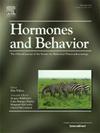Emotion regulation strategies differentially impact memory in hormonal contraceptive users
IF 2.4
3区 医学
Q2 BEHAVIORAL SCIENCES
引用次数: 0
Abstract
Hormonal contraceptives (HCs) are widely used, yet their effects on emotional and cognitive processes remain poorly understood. This study examined how HC use may influence emotional reactivity, emotion regulation, and emotional memory. Female participants (N = 179), either using HCs (N = 87) or naturally cycling (NC; N = 92), were randomly assigned to one of three groups: no emotion regulation (control), distancing and immersion, or reinterpretation and immersion. The emotion regulation groups completed emotion regulation training in which they viewed emotional images while applying different emotion regulation strategies, followed by a surprise memory test. Overall, HC users showed greater emotional reactivity to emotional images compared to NC participants. Both HC and NC groups successfully applied emotion regulation strategies as measured by changes in emotional affect; however, distancing led to a greater reduction in negative emotions compared to reinterpretation, particularly among HC users. Both HC and NC groups showed better memory for positive images after applying immersion. For negative images, HC users showed reduced memory performance when applying either distancing or reinterpretation, an effect not observed in NC participants. These findings suggest that HC use may influence specific aspects of emotional processing and memory, highlighting the need for more nuanced research on the cognitive and emotional effects of hormonal contraceptives.
情绪调节策略对激素避孕药使用者记忆的影响存在差异
激素避孕药(HCs)被广泛使用,但其对情绪和认知过程的影响仍然知之甚少。本研究考察了HC的使用如何影响情绪反应、情绪调节和情绪记忆。女性参与者(N = 179),使用hc (N = 87)或自然骑行(NC;N = 92),随机分配到三组中的一组:无情绪调节(控制),距离和沉浸,或重新解释和沉浸。情绪调节组完成了情绪调节训练,他们在使用不同的情绪调节策略的同时观看情绪图像,然后进行了意外记忆测试。总体而言,与NC参与者相比,HC用户对情绪图像表现出更大的情绪反应。HC组和NC组均成功地应用了情绪调节策略。然而,与重新解释相比,保持距离更能减少负面情绪,特别是在HC使用者中。浸泡后,HC组和NC组对正面图像的记忆均较好。对于负面图像,HC用户在使用距离或重新解释时表现出降低的记忆性能,而NC参与者没有观察到这种影响。这些发现表明,使用HC可能会影响情绪处理和记忆的特定方面,强调需要对激素避孕药的认知和情绪影响进行更细致的研究。
本文章由计算机程序翻译,如有差异,请以英文原文为准。
求助全文
约1分钟内获得全文
求助全文
来源期刊

Hormones and Behavior
医学-行为科学
CiteScore
6.70
自引率
8.60%
发文量
139
审稿时长
91 days
期刊介绍:
Hormones and Behavior publishes original research articles, reviews and special issues concerning hormone-brain-behavior relationships, broadly defined. The journal''s scope ranges from laboratory and field studies concerning neuroendocrine as well as endocrine mechanisms controlling the development or adult expression of behavior to studies concerning the environmental control and evolutionary significance of hormone-behavior relationships. The journal welcomes studies conducted on species ranging from invertebrates to mammals, including humans.
 求助内容:
求助内容: 应助结果提醒方式:
应助结果提醒方式:


